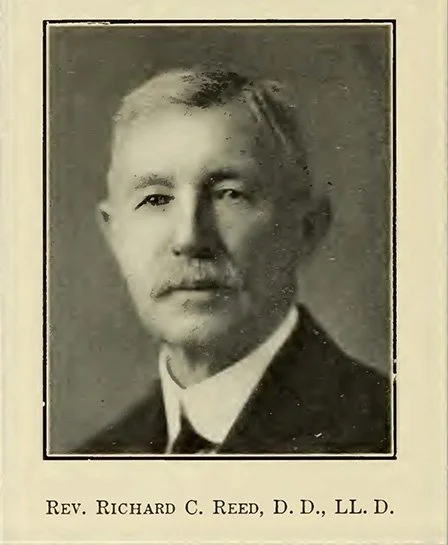Richard Clark Reed, Southern Presbyterian minister and theologian, died 100 years ago on this day in history, July 9, 1925, in Columbia, South Carolina.
Born on January 24, 1851 in Harrison, Tennessee, Richard Clark Reed was educated at King College (1873) and at Union Theological Seminary in Richmond, Virginia (1876).
His pastoral ministry began in 1877, when he was ordained and installed as the pastor of the Presbyterian Church at Charlotte Court House, Virginia, where he served for eight years. He ministered in Franklin, Tennessee for four years. He served as pastor of the Second Presbyterian Church in Charlotte, North Carolina from 1889 to 1892; and as pastor in Nashville, Tennessee from 1892 to 1898. In 1898, he accepted the chair of Church History, and Church Polity, in Columbia Theological Seminary, and served there until his death. He also served as Moderator of the General Assembly of the Presbyterian Church in the United States (PCUS) in 1922.
He was the author of many articles and some books, including The Gospel as Taught by Calvin (1896); History of the Presbyterian Churches of the World: Adapted For Use in the Class Room (1905); and What is the Kingdom of God? (1922). Reed's History of the Presbyterian Churches of the World served as the inspiration for James E. McGoldrick of Greenville Presbyterian Theological Seminary when he published Presbyterian and Reformed Churches: A Global History (2012). Reed also served as an editor at The Presbyterian Quarterly and at The Presbyterian Standard.
William M. McPheeters eulogized of him thus: "When his name is mentioned, the first picture that it will bring before our minds will unquestionably be that of Dr. Reed the man, the Christian man and minister. It was in that character that we knew, admired, and loved him. His fine presence, his modest, unassuming bearing, his genial and sunny disposition, his kindly interest in his fellows, his cheerfulness that was never permitted to degenerate into frivolity, his sobriety unmarred by the least taint of morbidness, his wisdom in counsel, his poise and patience under opposition, his tact in dealing with a delicate situation, his reverence, his filial confidence in God, his devotion to his Redeemer, his humble-mindedness before God, his readiness, as one who had himself freely received, freely to give his time, his sympathies, strength for the benefit of others — what a long list of admirable qualities it is! And I might add others. No wonder such qualities greatly endeared Dr. Reed to those who knew him. Together they constitute a picture to which memory will delight to recur and in dwelling upon which it will find heart's ease and inspiration."
We remember him today one full century after he entered into glory.

